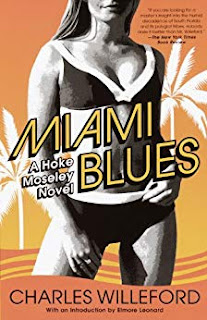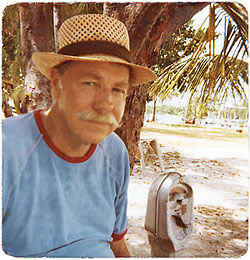Dolphins,
Daytona, Glades, and Gators notwithstanding, Florida has never held
much attraction for me. Not sure why. Been down there a few times, to
the races, to visit friends. No bad memories—I actually kind of
liked the place. I've enjoyed reading about it—MacDonald, Hiaasen,
Holland
come
to mind—but when I'm not actually there I
feel
no chemistry, no pheromones
pulling me south. Not like Callifornia, which I visited once long ago
and still carry in my heart.
Maybe
it has something to do with my mother and the oranges. She complained
that Florida oranges were more acidic than California oranges. I
never noticed any difference, but I'm
learning more and more
Gert's influence went
deep. Not that I look at the labels. She didn't go that
deep. I can't help but wonder, tho, if maybe her orange bias didn't
somehow affect my nonchalance toward Charles Willeford.
It's a stretch, I know, especially considering all of the positives.
Despite
enthusiastic endorsements from a couple of crime authors whose blogs
I followed—Ed Gorman and Bill Crider—I never had quite enuf itch
to read Willeford.
It took another crime author, Ben Boulden of
Gravetapping,
to lead
me into Willeford's world. Boulden
posted
a
link
on
Facebook that
took
me to the
gate,
a long Daily
Beast piece
on Willeford, with this headline:
The
Train-Hopping, Nazi-Fighting Literary Hero You’ve Never Heard Of.
Resist a pitch like that?
Hell, I read a few paragraphs and suddenly my fingers dashed off to the Kindle library and with no more thought than it takes to breathe downloaded Willeford's first novel, Miami
Blues,
which
is also the first in his four-book series featuring Detective Hoke
Moseley. I will read the rest, if my doctor allows me to do that much
laughing and experience that much suspense. I shook my apartment's
flimsy walls laughing at the opening scene, perhaps echoing
Willeford's own laughter when he described it to friends (see
Marshall Jon Fisher's
piece in The Atlantic
if you think I exaggerate). In fact, I'll let Fisher, whose parents
knew Willeford, describe it himself:
"I remember him roaring with laughter while telling my parents
about the opening scene of his novel-in-progress, which would become
Miami
Blues.
In it Freddy Frenger, a haiku-writing psychopath, brutally breaks the
finger of a Hare Krishna in the Miami airport. Frenger goes on his
merry way, and the Krishna collapses in shock--and dies."
Miami
Blues
doesn't have much of a plot, and it includes the kind of
coincidences critics sniff at writers for, calling the unrealistic
events deus
ex machina. Well,
bon
golly molly!
Willeford,
who won the Silver Star in WWII, gave a couple of nostrils full of
industrial grade ammonia to any critics who wished to sniff at the
big fat deus
ex machina he
stuck
right
in chapter one:
The
19-year-old hooker Freddy Frenger hooks up with at the hotel, where
he’s staying under a fake name is, unbeknownst to him, the dead
Hare Krishna’s sister.
And
Willeford follows this up with another, an even more outrageous deus
ex machina, giving
sniffing critics
a one-two punch combo (he did some boxing, too), when he brings
series star Moseley together with the doomed (we know) young couple
driving them to the morgue so the hooker can identify her brother. In
the car Moseley’s cop instincts immediately pick up that Frenger’s
hinky, but as he’s only investigating the Hare Krishna’s death he
merely files this away for possible future reference. Neither Moseley
nor Susie Waggoner, the hooker, know Frenger’s the one who broke
the finger. You must believe me that altho this sounds like a blazing
satire, Willeford delivers the humor so slyly, so nonchalantly,
you’re apt to ease along with it, laughing to yourself while
seriously hooked on wondering what the hell the next page will
reveal. I did, anyway.
One more laugh and then I’ll move along to something else. Susie’s an
inexperienced, barely competent hooker who came to Miami from
Okeechobee with her brother to abort the baby he’d impregnated her
with. They decided to stay in Miami—brother hustling Hare Krishna
at the airport, Susie hooking at the hotel, to earn enuf money to buy
a Burger King franchise. Frenger “rescues” Susie from her job and
takes her to another hotel. He tells her they’re married
“platonically,” which she seems to understand, altho what Frenger
really means is that they’re shacking up, which she accepts without
question. He’s the nicest man she’s ever known, she tells him,
and evidently means it.
While
Susie keeps house Frenger’s at the mall mugging drug dealers and
pickpockets, and Detective Moseley returns to his daily life, which
amounts to paying half his sergeant’s salary to his ex, and living
free in a Miami Beach fleabag hotel where he earns his keep doing
minimal security work. Things heat up when Frenger, who somehow gets
Moseley’s address, mugs him in his hotel room, beating him badly
and stealing his gun, his badge, and his blackjack.
Moseley
wakes up in a hospital with no idea who attacked him. The narrative
here becomes so realistic--focusing on the injuries, the treatments,
the hospital expenses, the problems his department has muting the
embarrassment of a cop losing his badge and gun, the fact that he’s
been living illegally out of his jurisdiction—that, even tho I
hadn’t thought I’d gotten to know Hoke much yet, I cared about
all of this, as if he were a friend or relative.
When
the narrative shifts to Frenger’s problems, his viewpoints, his
predicaments, I feel as as if he’s the brother who went bad, but is
still a brother. Willeford’s writing incrementally creeps into your
sensibility (mine, anyway), making it hard not to identify with which
ever viewpoint is at bat. And there are believable parallels—each
is even struggling to quit smoking. We know they’ll inevitably meet
again, and it won’t be friendly.
As
the showdown approaches, we’re in Moseley’s head, filled with the
need to avenge himself as well as bring a criminal to justice. He’s
ambivalent about the meeting. “The
more he thought about [Frenger], the more afraid he was,” he tells
himself. “This was not paranoia. When a man has beaten you badly
and you know that he can do it to you again, a wholesome fear is a
sign of intelligence...his only chance was to spot him in the street,
and that seemed damned unlikely. Deep down, way down there in the pit
of his stomach, he hoped he wouldn’t find him”
He’s
still musing when he finally does:
“Freddy
Frenger, Jr., AKA Ramon Mendez, had played out the game to the end
and didn’t really mind losing his life in a last-ditch attempt to
win. Junior would have been good at checkers or chess, thought Hoke,
where sometimes a poor player can beat a much better one if he is
aggressive and stays boldly on the attack. That was Junior, all
right, and if you turned your head away from the board for an
instant, to light a cigarette or to take a sip of coffee, he would
steal one of your pieces. Junior didn’t have to play by the rules,
but Hoke did.”
Well.
We know who won, else there wouldn’t be three more published Hoke
Moseley novels and another one available in
typescript available for reading only in the Charles Willeford
Archive at the Broward County Library.
Oh,
I must not omit the last laugh, on the last page, an item in The
Okeechobee Bi-Weekly News:
OCALA—Mrs.
Frank Mansfield, formerly Ms. Susan Waggoner, of Okeechobee, won the
Tri-County Bake-Off in Ocala yesterday with her vinegar pie entry.
The recipe for her winning entry is as follows:
I
thought it was a joke, as I’d never heard of nor could imagine
vinegar pie. I Googled it. It’s real, it’s Southern, and it sounds right tasty.The recipe's the last thing in the book!



I need to read more Willeford. Thanks for the reminder and the link to the article.
ReplyDeleteMy pleasure, Elgin. I intend to read more Willeford too!
Delete